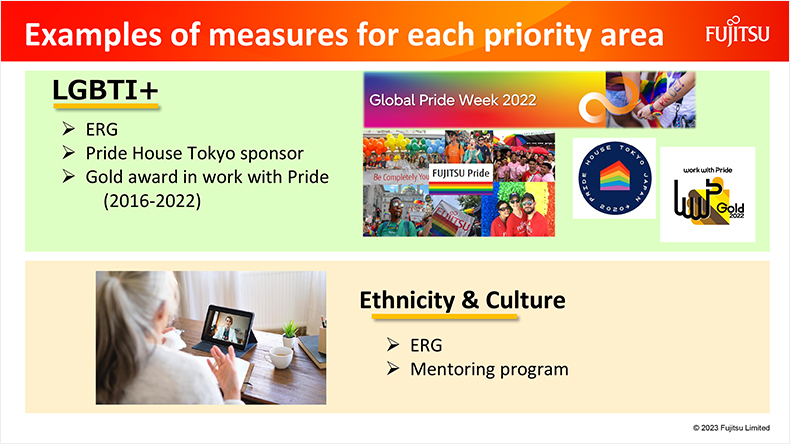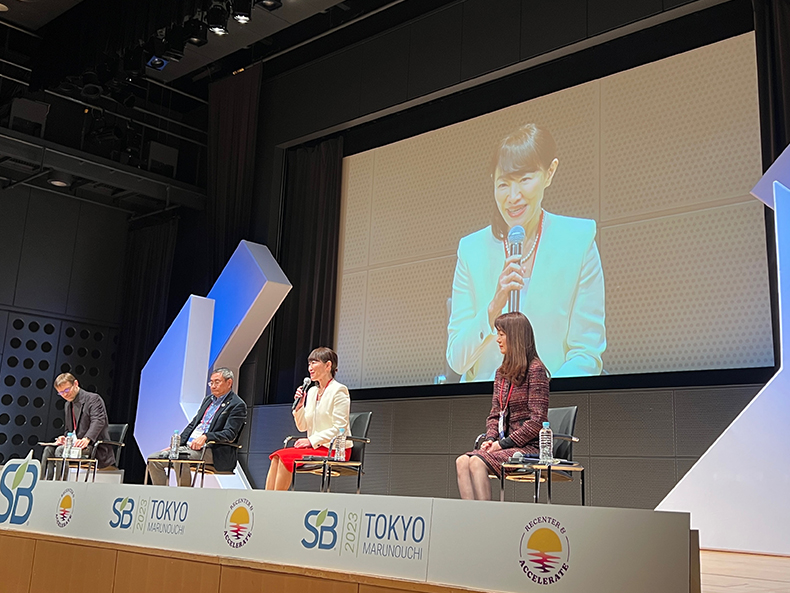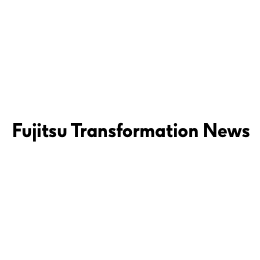- Table of Contents
Sustainability Management to Enhance Competitiveness
In the session titled “Will sustainability management lead to competitiveness? The key to transforming to a trade-on model,” Fujitsu’s CMO Yamamoto joined Nihon L'Oréal K.K. and Lion Corporation on stage to discuss the sustainability management of each company.
Trade-on is the opposite of trade-off, which means to sacrifice something in order to gain something, and the idea is to profit without sacrificing anything. In this section, we will introduce our sustainability management, which aims for a trade-on approach, as described by Yamamoto in the session.
Fujitsu is conducting sustainability management while establishing non-financial indicators as well as financial indicators to ensure that all of our business activities are moving toward realizing our Purpose-to make the world more sustainable by building trust in society through innovation. By managing not only financially but also non-financially, Fujitsu is creating a positive circulation whereby we can make a long-term stable contribution to society, and this will in turn create growth opportunities for our company.

We also surveyed executives and decision makers around the world to analyze their attitudes toward sustainability and what they consider as the keys and barriers to achieving their sustainability goals. We found that companies that emphasized on technology and sustainability achieved better business results, and these companies are called changemakers. In order to achieve sustainability transformation (SX), Fujitsu will become a changemaker and support our customers to become changemakers as well.
To this end, we have launched a business brand-Fujitsu Uvance-and are taking on the challenge of solving social issues of our customers. Our brand has been receiving good reputation over the past few years because of implementation of these Purpose-driven corporate activities.

In the latter half of the session, a question-and-answer period was held. A participant asked “How did you create the Purpose (company’s existence value), which is important for management, and how did you draw out the thoughts of employees as well as top management?”
Fujitsu set up a Purpose Team and interviewed the president intensively about his ideas. We also gathered voices from customers and retired employees. We conducted Purpose carving for employees to create opportunities to think about the Purpose. This is an initiative to have participants reconfirm their own Purpose by reflecting on what they have liked and valued in their childhood, and to align their values with the company’s Purpose. This Purpose carving has also gradually improved employee satisfaction.
When asked how she would set KPIs or goals to realize trade-on, Yamamoto responded that she would include loyalty and attachment as one of the indicators. The reason is that sales trends show that departments with high customer loyalty tend to have higher sales. In response to this, other speakers also commented on the importance of a viewpoint of loyalty in order to realize trust beyond contract and to strengthen relationships with customers.
DEI&B-essential for well-being
In order to maintain well-being-a state in which employees can work with vitality and health both mentally and physically-it is essential to recognize diversity, equity, and inclusion (DE&I). In recent years, in addition to DE&I, a sense of belonging (B) has begun to be recognized as an essential element. Well-being can be realized when one feels that they belong to society with a sense of contribution and motivation.
The session on “DEI&B-essential for well-being” was facilitated by a host of the Sustainable Brands conference, with panelists from QVC Japan, Inc. and INTAGE Inc.-both of which are leaders of this area-and Head of DE&I Promotion Office, Hiromi Kimura from Fujitsu Limited. In the first half of the session, each company introduced their initiatives, and in the second half, panelists discussed about DEI&B. We will introduce examples of Fujitsu’s efforts and Kimura’s own views.
DE&I and the practice of the Fujitsu Way-the foundation for action for all Fujitsu employees-are deeply connected. In the Fujitsu Way, we believe that the key to innovation is to freely and openly share and discuss one’s own opinions and values with an open mind, and this links diversity with innovation. As everyone has different attributes, skills, and experience, it is important to provide tools and opportunities that suit each person, which is called equity. We aim to create an excellent organization that can take actions with an awareness of our differences by respecting the individual experience and values.
Fujitsu renewed its ideal state of DE&I in April 2022 after numerous discussions among global DE&I leads and employee resources groups. The value of belonging that we emphasized is expressed in the word togetherness, which is associated with excitement.
What Fujitsu Aspires to Be:
- Be a responsible business that reflects the diversity of our world.
- Build an inclusive and equitable culture where everyone belongs and can be completely themselves.
- We will celebrate difference and ensure that people can succeed regardless of their personal identity.
- Through inclusive design and innovation, we will endeavor to make a positive impact within society and empower each other to make the world more sustainable.
As an example, Fujitsu has implemented the following measures.

 Examples of Fujitsu’s main measure
Examples of Fujitsu’s main measure
During the discussion in the latter half of the session, the speakers discussed enthusiastically on the theme of what is essential for realizing well-being. Kimura commented that well-being cannot be realized by feeling happy instantly. Continuous accumulation of happiness in a hopeful environment with a prospective vision is important. In order to achieve this, she said, it is necessary to accept people as they are-not to change them or yourself to fit the organization-and to accept people with various values-not to see things only within your own sense of values. She also expressed her own view that it is important to communicate respectfully with each other and to be a person who thinks differences are valuable.
Furthermore, on the topic of Generation Z’s views on work, she insisted that lumping people together as Generation Z can be a bias, so it is important to look at each individual and talk to them with words that fit their values.
 Fujitsu DE&I Promotion Office Manager Kimura at the session
Fujitsu DE&I Promotion Office Manager Kimura at the session
Essential elements for the future management
Companies that pursue only profit will not survive. It is important to maintain a high awareness of sustainability in the management, not only to customers, but also to society and the future. The same can be said for DEI&B.
Companies that turn their backs on it will eventually lose their competitiveness. We need to remember that each one of us, not the companies, should think about DEI&B.
Fujitsu will continue to challenge to realize a more sustainable world through digital innovation in the midst of changing society.



